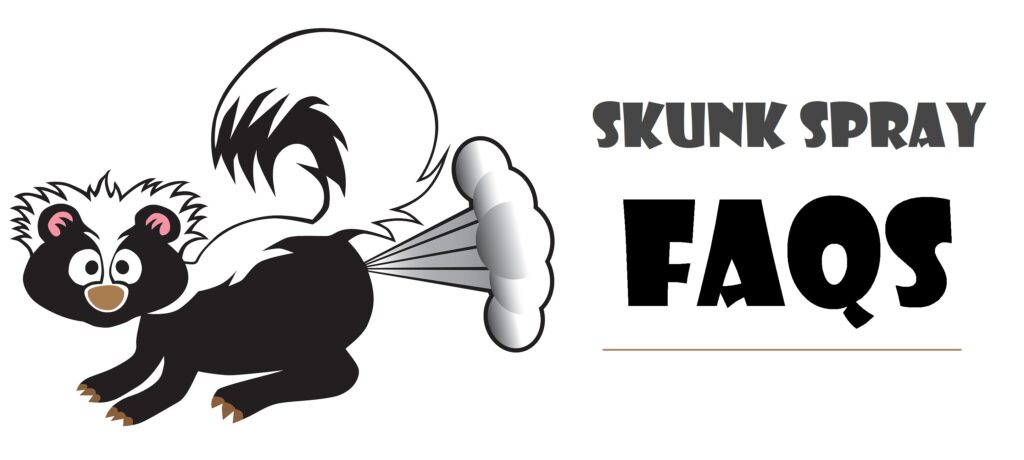Many people are curious about skunk smell. Although beautifully-adorned with glowing white stripes atop a luscious black coat of shiny fur, these common land critters tend are pretty, but also pretty stinky! Below you will find a list of the most frequently asked questions about skunk smell and skunk spraying, including how to protect your property against nuisance skunks.

Skunk Smell FAQS
Why Do Skunks Spray?
Skunks spray to defend themselves. It’s that simple. If someone or something gets too close and threatens their safety or comfort, they will stomp their feet, puff up, and lift their tails in warning. They will follow this demonstration by spraying if the threat is persistent. Curious dogs are the most common victim of skunk spraying because they do not easily give up after just a sniff or two.
How Does a Skunk Spray?
Skunks have two anal scent glands that hold the substance that generates their spray. Skunks use their anus muscles to eject the spray out of two nipple-like ejectors on both sides of their anus, below their tail. These ejectors can spray a target up to 10 feet away! But after a full discharge, it can take over a week for a skunk to regenerate their spray reserves.
Will Skunk Spray Harm Me? Will it Harm My Pet?
Skunk spray is not necessarily dangerous, and it is certainly not toxic or disease-ridden, but it is very unpleasant smelling and overwhelming. Without the right cleaning approach, it can linger on clothing, skin, and fur for weeks. Skunk spray is a chemical-based liquid that contains organic compounds known as thiols. These compounds contain sulfur, which is responsible for that tell-tale skunky smell. The most common side effects of the smell are nausea, headache, and agitation. So long as you do not approach a skunk in the wild, you should not have anything to worry about.
The only issue you have to worry about in terms of skunks and outdoor pets is how to remove skunk smell if they are ever sprayed.
How Do I Remove Skunk Smell on My Dog or Cat?
To remove skunk smell on a dog or cat, combine 1 quart of hydrogen peroxide with a ¼ cup of baking soda and 2 teaspoons of liquid dish soap. Be sure to wear gloves when using this solution! Simply apply it as you would shampoo and use it to clean skunk smell from your pet’s fur, as well as your clothes, skin, and hair. Repeat the cleansing process multiple times until the odor is eliminated. Finish by using your pet’s regular shampoo product.
How Do I Prevent Skunk Spraying Encounters?
You can significantly reduce the likelihood of a skunk encounter if you protect your property against wildlife intrusions. Skunk trapping and removal should be carried out by a licensed and insured Indianapolis critter control company. They have the resources, training, and permits to safely remove skunks and implement proven animal-proofing strategies to get rid of skunks and keep them away for good. If you live near wooded or forested areas, or near a large body of water, you need a solid animal-proofing plan in place whether you see skunks around or not.
Are you noticing an increase in skunk activity around your property? Contact Modern Wildlife Control at 317-847-6409 for licensed and insured skunk removal services in Indianapolis, Indiana. We serve residential and commercial clients.
Related Posts:
4 Safe Methods of Getting Rid of Skunks
Do This if You See a Wild Skunk
How to Make Your Own Non-Toxic Animal Repellent Spray
